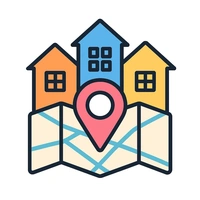
Neighborhood Guide in Lagos, Lagos, Nigeria
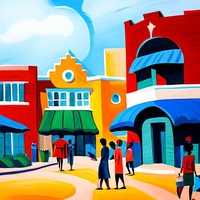
1. Victoria Island
Victoria Island is a vibrant commercial and finance hub known for its upscale dining and nightlife. It provides a safe and lively environment that reduces the stress of adapting to a new city. Easily accessible from many parts of Lagos, it's also home to many multinational companies and embassies.
- Safety: One of the safer areas in Lagos with frequent police patrols.
- Accessibility: Well-connected by roads and bridges to other parts of Lagos.
- Amenities: Offers numerous high-end restaurants, hotels, and shopping centers.
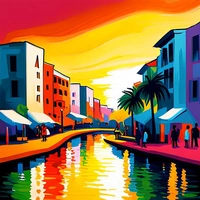
2. Lekki
Known for its luxury properties and shopping, Lekki is a popular area for expatriates and tourists. It offers a balance of city life and nature with beaches and tourist attractions nearby. This area facilitates a more affluent lifestyle, offering exclusivity and convenience.
- Living Costs: Considerably higher rental and living expenses.
- Tourist Attractions: Proximity to Lekki Conservation Centre and Lekki Arts and Crafts Market.
- Infrastructure: Ongoing construction may lead to occasional traffic congestion.
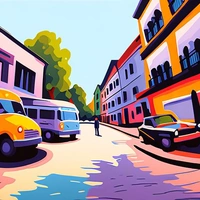
3. Ikeja
Ikeja is the capital of Lagos State and offers a mix of shopping, business, and entertainment facilities. Convenient for travelers, it's home to the Murtala Muhammed International Airport and several malls. This area solves the challenge of accessing essential services and transportation quickly.
- Proximity to Airport: Only a few kilometers from the international airport.
- Business Culture: An economic hub with many businesses and industries.
- Traffic: Considerable congestion during peak hours.
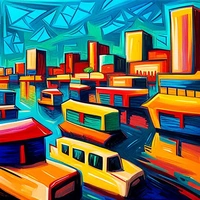
4. Apapa
Apapa is a major import and export hub due to its seaport, one of the busiest on the continent. It provides vital support for international and local trade, reducing logistics challenges for businesses. It also features some colonial-era architecture, offering a glimpse into historical Lagos.
- Security: Monitor for safety, as port areas may experience security challenges.
- Historical Value: Features unique architectural styles from the colonial period.
- Industrial Activity: High concentration of industrial operations and warehouses.

5. Yaba
Yaba, often called the Silicon Valley of Nigeria, is home to technology companies and innovations. This neighborhood offers coworking spaces and tech hubs, making it ideal for digital nomads and tech enthusiasts. Access to education and innovation resources addresses the need for connectivity and growth.
- Entrepreneurial Hub: Ideal environment for start-ups and tech businesses.
- Education: Near educational institutions like the University of Lagos.
- Residential Options: Affordable housing options compared to upscale neighborhoods.
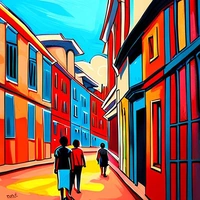
6. Surulere
Surulere is a middle-class residential area known for its sports, notably the National Stadium. It offers cultural experiences and is renowned for its culinary diversity, providing authentic Nigerian cuisine. These features make it easier for travelers to experience local culture and community.
- Local Experience: Offers a more traditional and authentic Lagos experience.
- Entertainment: Features film and music studios, contributing to Afrobeat and Nollywood.
- Transportation: Public transportation options are readily available.
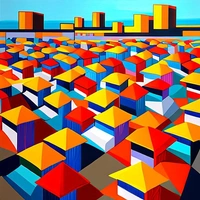
7. Ikoyi
Ikoyi is one of the most affluent neighborhoods, featuring luxury apartments and lush greenspaces. It offers a serene environment with lower noise levels compared to commercial districts, boosting privacy and tranquility. The exclusive residential setting solves the demand for prestige and exclusive access.
- Affluent Living: High cost of living with upscale amenities.
- Greenspace: Proximity to parks and recreational facilities.
- Security: Gated communities with heightened security measures.

8. Ajah
A rapidly developing area that offers more affordable housing compared to Lekki. It combines urban facilities with rural accessibility, making it an emerging residential choice. The area's expansion reduces the housing affordability challenge in Lagos.
- Development: Continuous infrastructure development bringing growth.
- Affordability: More budget-friendly housing options.
- Connectivity: New roads improve access to main business districts.
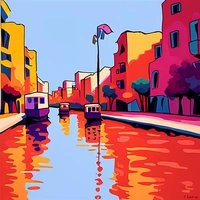
9. Isolo
A suburban area preferred for its quiet environment and community living. It provides a refuge from the bustling city life, making it suitable for families seeking a slower pace. The local markets and shops help to meet daily needs without city-center trips.
- Family-Friendly: Quiet neighborhoods and good local schools.
- Local Markets: Community-focused commerce with essential goods.
- Accessibility: Farther from city center, requires transportation planning.
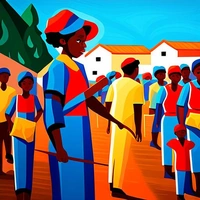
10. Badagry
Known for its historical significance, Badagry offers insights into Nigeria's past with its slave museum and heritage sites. Located close to the border with Benin, it also offers unique shopping experiences in local markets. Provides educational value and cultural immersion.
- Historical Sites: Home to significant landmarks like the Badagry Heritage Museum.
- Border Proximity: Near Seme Border, important for cross-border trade.
- Tourism: Attracts visitors interested in history and culture.
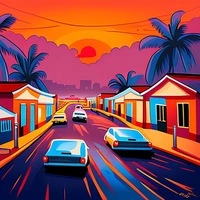
11. Agege
Known for its bustling markets and local cuisine, Agege offers a lively atmosphere where visitors can enjoy street foods and local vibes. The community spirit here is strong, making it welcoming for those looking to engage with residents. Provides a gateway into the traditional way of life in Lagos.
- Street Food: Famous for Agege bread and other local delicacies.
- Cultural Vibrancy: Active community with frequent events and celebrations.
- Accessibility: Easily reachable by public transport from other parts of Lagos.
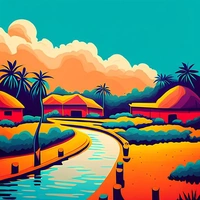
12. Epe
Epe provides an escape with its scenic landscapes and waterfront areas. Known for its fishing markets, it offers fresh seafood and an authentic look into local fishing culture. This neighborhood appeals to those seeking relaxation and nature experiences.
- Scenic Beauty: Offers beautiful landscapes and waterways.
- Seafood Market: Renowned for fresh produce and local fish markets.
- Relaxation: Less crowded, offering a peaceful retreat from city life.
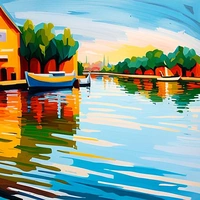
13. Maryland
Maryland acts as a bridge between the mainland and island, providing both residential and commercial opportunities. Known for its educational institutions and healthcare facilities, the area supports practical living needs. Fulfills essential service access requirements.
- Education: Numerous schools and educational facilities.
- Healthcare: Availability of medical centers and clinics.
- Mixed-Use: Balance of residential areas and commercial opportunities.
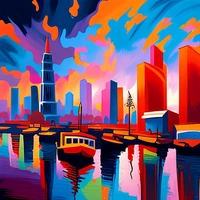
14. Ogudu
A residential area with green nature parks, Ogudu offers a blend of peaceful living and city convenience. It hosts several green recreational spaces, allowing for leisure and outdoor activities. The increased space helps overcome the limitations of typical urban living.
- Residential Peace: Quiet and safe with family-friendly vibes.
- Nature Parks: Access to parks and walking trails.
- Infrastructure: Recently upgraded roads and drainage systems.
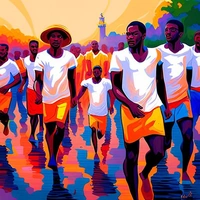
15. Ebute-Metta
Ebute-Metta is a railway hub, making it significant for travelers looking to explore Nigeria by train. The colonial-era architecture provides a glimpse into Lagos's history. This solves the transport challenge with alternate transit routes.
- Transportation: Major railway station linking Lagos to other regions.
- Historical Interest: Colonial buildings and traditional Yoruba structures.
- Vibrant Markets: Offers a variety of goods at the local markets.
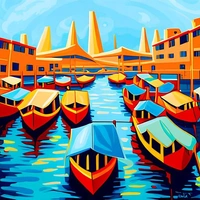
16. Gbagada
Gbagada features a mix of commercial and residential environments, along with general hospitals and local markets. A key appeal is the central location with easy access to both Lagos Island and Mainland. The strategic location resolves commuting difficulties.
- Healthcare Facilities: Hosts general hospitals and clinics.
- Central Location: Convenient access to major Lagos areas.
- Diverse Opportunities: Combination of residential peace and commercial activities.

17. Mushin
Though densely populated, Mushin is home to vibrant markets and thriving small businesses. Recognized for its dynamic atmosphere, it caters to a diverse socioeconomic community. Overcomes economic constraints with budget-friendly options.
- Economic Diversity: Focus on small business and entrepreneurship.
- Affordability: Cost-effective living and shopping.
- Community Life: Strong local connections and cultural festivals.

18. Ojota
Ojota is known for its transport interchange and cultural atmosphere highlighted by its proximity to the Kudirat Abiola Memorial Park. The area is busy yet retains an essence of historical Lagos with its traditional shopping experiences. Addresses public transport needs for travelers.
- Transport Hub: Connecting point for buses and interstate travel.
- Cultural Sites: Near landmarks and memorial parks.
- Vibrant Setting: Busy environment with plentiful shops and eateries.
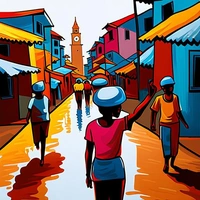
19. Magodo
A gated community providing exclusive living in Lagos, Magodo is known for its security and privacy. It features organized housing estates with modern amenities. Reduces urban challenges with its infrastructure and controlled environment.
- Security: Gated estates with enhanced safety measures.
- Exclusive Living: Higher cost but premium lifestyle options.
- Green Spaces: Well-maintained parks and recreational facilities.

20. Festac Town
Proposed by UNESCO as a World Heritage Site, Festac Town offers a well-planned environment oriented towards community and art. It's historically significant due to FESTAC'77, celebrating African culture. This neighborhood supports artistic and cultural exploration.
- Planned Community: Designed layout with accessible amenities.
- Cultural Significance: Known for its connections to African art and festivals.
- Local Events: Often hosts art exhibitions and cultural gatherings.
